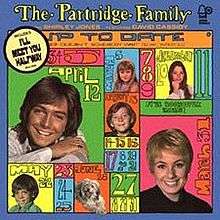Up to Date
| Up to Date | ||||
|---|---|---|---|---|
 | ||||
| Studio album by The Partridge Family | ||||
| Released | February 1971 | |||
| Recorded | 1970 | |||
| Genre | Pop | |||
| Length | 31:34 | |||
| Label | Bell | |||
| Producer | Wes Farrell | |||
| The Partridge Family chronology | ||||
| ||||
| Professional ratings | |
|---|---|
| Review scores | |
| Source | Rating |
| AllMusic | |
The Partridge Family's second album, Up to Date, was released in February 1971. It contained such hits as "I'll Meet You Halfway" (Billboard #9) and "Doesn't Somebody Want to Be Wanted" (U.S. Billboard #6 and Cash Box #1, Canadian RPM #1).[2]
The album reached #3 on the U.S. Billboard album chart and #1 in Canada on the RPM national Top Albums chart. The musicians were Hal Blaine on drums, Joe Osborn on bass guitar, Mike Melvoin on keyboard, Dennis Budimir and Louie Shelton on guitars. As with all Partridge Family albums (with the exception of Bulletin Board), it was produced by Wes Farrell at United Western Recorders, studio 2 in Los Angeles.
Up to Date features David Cassidy's first contribution as a songwriter. Cassidy penned the song "Lay It on the Line" with Wes Farrell. The song features a strong guitar track. Cassidy publicly despised one of the LP's hits, "Doesn't Somebody Want to Be Wanted", and making it proved to be a very hard task.[3] He didn't think it was a good song at all and hated the idea of his having to talk in the middle of it so much so he refused to do it.[3]
This caused consternation with the studio and the record company, where the heads of both Bell Records and Screen Gems, which, at the time, were the respective record and television divisions of the major Hollywood studio Columbia Pictures, got involved.[3] Production shooting of the TV series was halted in order to provide a place in time where his manager and agent could talk to him over the issue.[3] One of the things they were saying was about how many more copies of the record would be sold if it contained a speaking role from him.[3]
They put pressure on him until he caved in and did the record as requested. When it was finished, he was unsuccessful in trying to keep the record shelved in Bell's vaults.[3] His feelings toward the song have remained negative:
| “ | It was horrible, I was embarrassed by it. I still can't listen to that record.[3] | ” |
The album cover was designed in the form of a calendar indicating the birthdates of the family (including their dog, Simone), which were the actual birthdates of the cast members. The album also included a bookcover. This was the last album to feature Jeremy Gelbwaks as Chris Partridge on the cover, as he left the show soon after its release.
Track listing
All tracks from the album, except "Lay It on the Line" and "Morning Rider on the Road", were featured in the first season of the TV show
Side 1
- "I'll Meet You Halfway" (Wes Farrell, Gerry Goffin)
- "You Are Always on My Mind" (Tony Romeo)
- "Doesn't Somebody Want to Be Wanted" (Wes Farrell, Jim Cretecos, Mike Appel)
- "I'm Here, You're Here" (Wes Farrell, Gerry Goffin)
- "Umbrella Man" (Wes Farrell, Jim Cretecos, Mike Appel)
- "Lay It on the Line" (David Cassidy, Wes Farrell)
Side 2
- "Morning Rider on the Road" (Tony Romeo)
- "That'll Be the Day" (Tony Romeo)
- "There's No Doubt in My Mind" (Wes Farrell, Gerry Goffin)
- "She'd Rather Have the Rain" (Terry Cashman, T.P. West)
- "I'll Leave Myself a Little Time" (Steve Dossick)
Personnel
- David Cassidy - vocals
- Dennis Budimir, Louie Shelton - guitar
- Joe Osborn - bass
- Mike Melvoin - keyboards
- Hal Blaine - drums
- Bahler Brothers (tracks: A6 to B5), Jackie Ward, Ron Hicklin, Shirley Jones - background vocals
- John Bahler (tracks: A1 to A5), Stan Farber (tracks: A1 to A5) - uncredited background vocals
References
- ↑ http://www.allmusic.com/album/r14927
- ↑ Item Display - RPM - Library and Archives Canada
- 1 2 3 4 5 6 7 C'Mon Get Happy - Fear and Loathing on the Partridge Family bus by David Cassidy and Chip Deffaa, Warner Books Inc, 1994. pp 70-71 ISBN 0-446-39531-5
| Preceded by Love Story (Original Soundtrack) |
Canadian RPM 100 number-one album May 15–22, 1971 (two weeks) |
Succeeded by Jesus Christ Superstar by Original Cast |